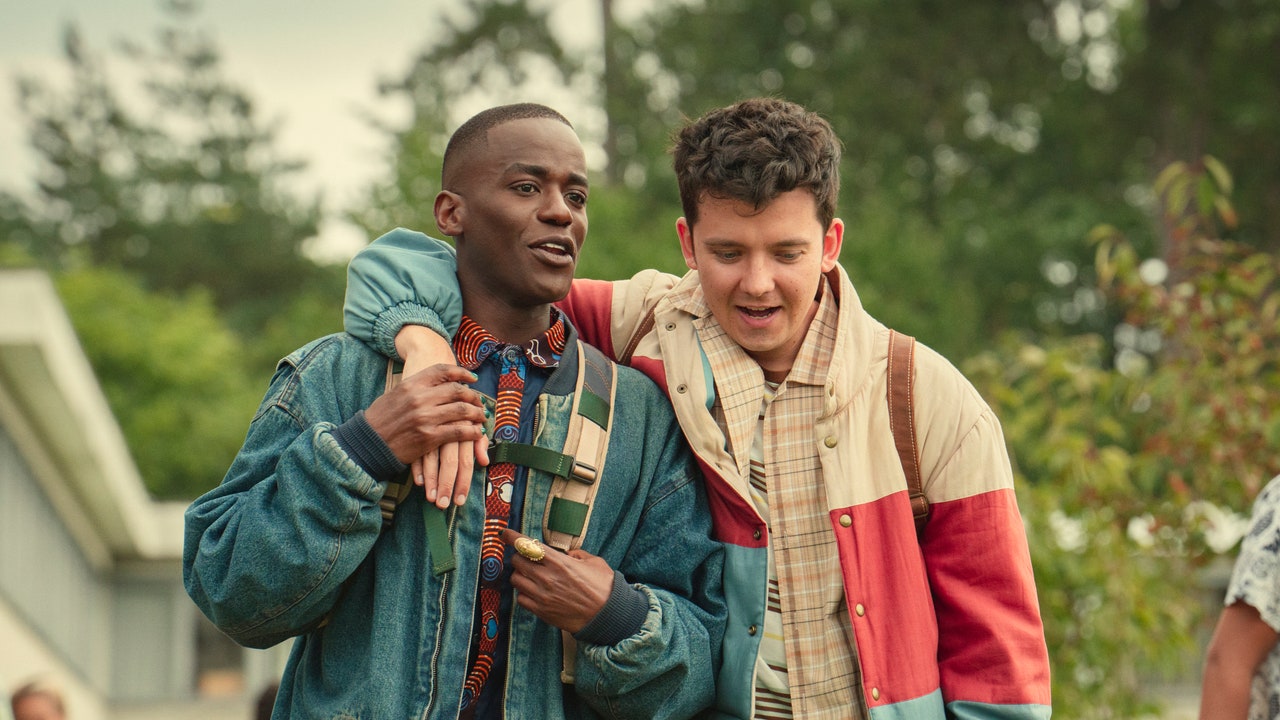This post contains plot details for Sex Education season 4.
When Sex Education’s first season dropped on Netflix at the start of 2019, it felt like a raunchy, cringe-inducing relief from Trump and Brexit-era politics. Set in a retro parallel universe, it had one foot in the past (lots of 80s music and clothing) and the other in the present (iPhones, contemporary pop culture references). The series initially revolved around virginal teenager Otis (Asa Butterfield), who picks up a knack for advice from his sex therapist mother Jean (Gillian Anderson). With encouragement from tough girl-with-a-heart-of-gold Maeve (Emma Mackey), Otis begins an underground counseling service for his schoolmates at Moordale Secondary School, offering often graphic tips on a startling array of carnal challenges. Vaginismus, revenge porn, alien sex fantasies, breast-binding, chlamydia, abortion, anal douching, slut shaming, sexual assault: Sex Education explored them all with its trademark humor and kindness.
It seemed like a fun, wholesomely filthy update of classic American teen comedies as reimagined by a smart young British playwright (creator Laurie Nunn). But four years later, as the series comes to a close, Sex Education feels less like an escapist romp and more like a front on the cultural battlefield. At a moment when American schools are increasingly banning books and blocking classroom instruction on LGBTQ+ topics and sex education generally, when abortion rights are ever more threatened and attacks on gender-affirming care for trans youth mount in both the US and UK, a series that sprinkles sex positivity over every surface resonates in a whole different way. Especially when this series is a massive global success.
As if recognizing this, Sex Education ended season three in a blaze of rebellion against the forces of repression. Over the course of that season, new Moordale headmaster Hope Haddon (Jemima Kirke) had attempted to repair the school’s bad reputation (it was labeled “sex school” by a local tabloid) by forcing students to wear uniforms, censoring sex ed classes, and publicly shaming those she deemed sexually deviant. Moordale’s student body exploded in glorious insolence, mounting an extravaganza—complete with a school band version of Peaches’ “Fuck the Pain Away” and a student-painted Wall of Vulva—that led to the school being defunded and shut down.
Now some of the characters have transferred to Cavendish. A ”student-led” school, Cavendish could not be more different from stuffy Moordale, thanks to its candy-colored color palette, its daily meditation practice and its flamboyantly progressive values. “Everyone seems happy,” Otis marvels to his best friend Eric (Ncuti Gatwa) when they first arrive. “And queer!” adds Eric, who has learned not to hide his own queerness over the last three seasons. He is delighted to discover that Cavendish’s most popular kids—Abbi (Anthony Lexa) and Roman (Felix Mufti) —are trans. They quickly absorb him into their clique, creating a small rift between Eric and Otis. “He’s always been my person, but sometimes I feel he doesn’t entirely get me,” Eric tells his new friends of Otis. When Eric later gently tries to explain that he and Otis really don’t talk about their racial or financial or religious differences, Otis squirms away from the conversation.
Otis has always been alternatively endearing and self-centered. His brattiness takes center stage this season as he arrives at the new school assuming that he will resume his role as sex therapist, and finds a young woman named O (Thaddea Graham) already operating a practice at Cavendish. He asserts his privilege over O, nastily trying to swipe her clients. But his attempts to introduce himself to the school backfires when he inadvertently broadcasts his sad attempt at a dick pic (complete with poorly trimmed pubic hair) to his classmates. “No one will want to have therapy with creepy pube man,” he says mournfully afterwards.




